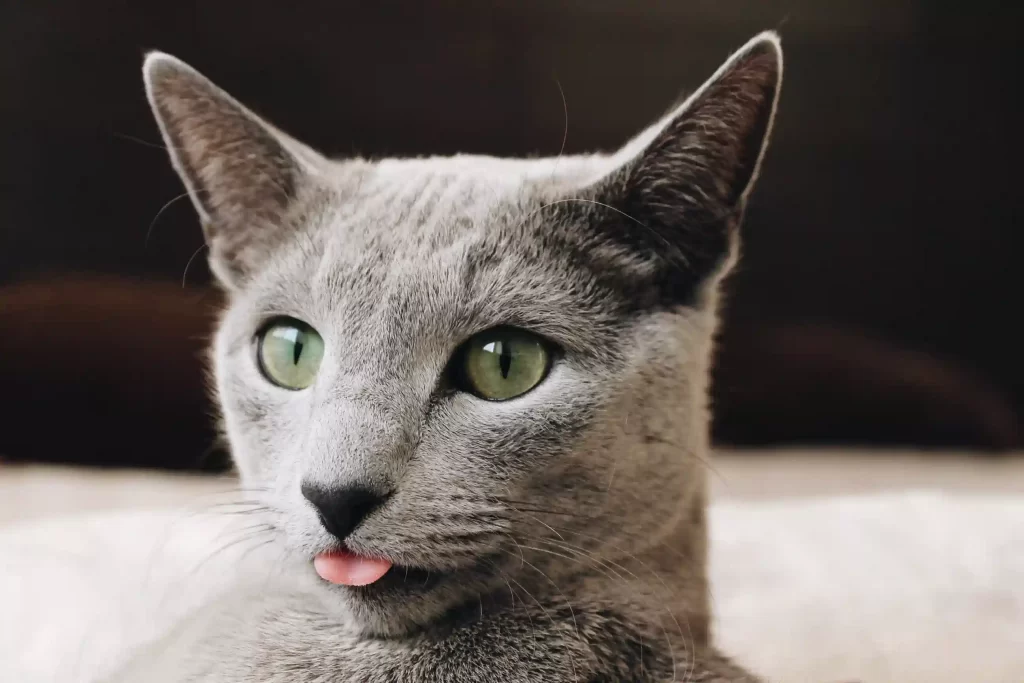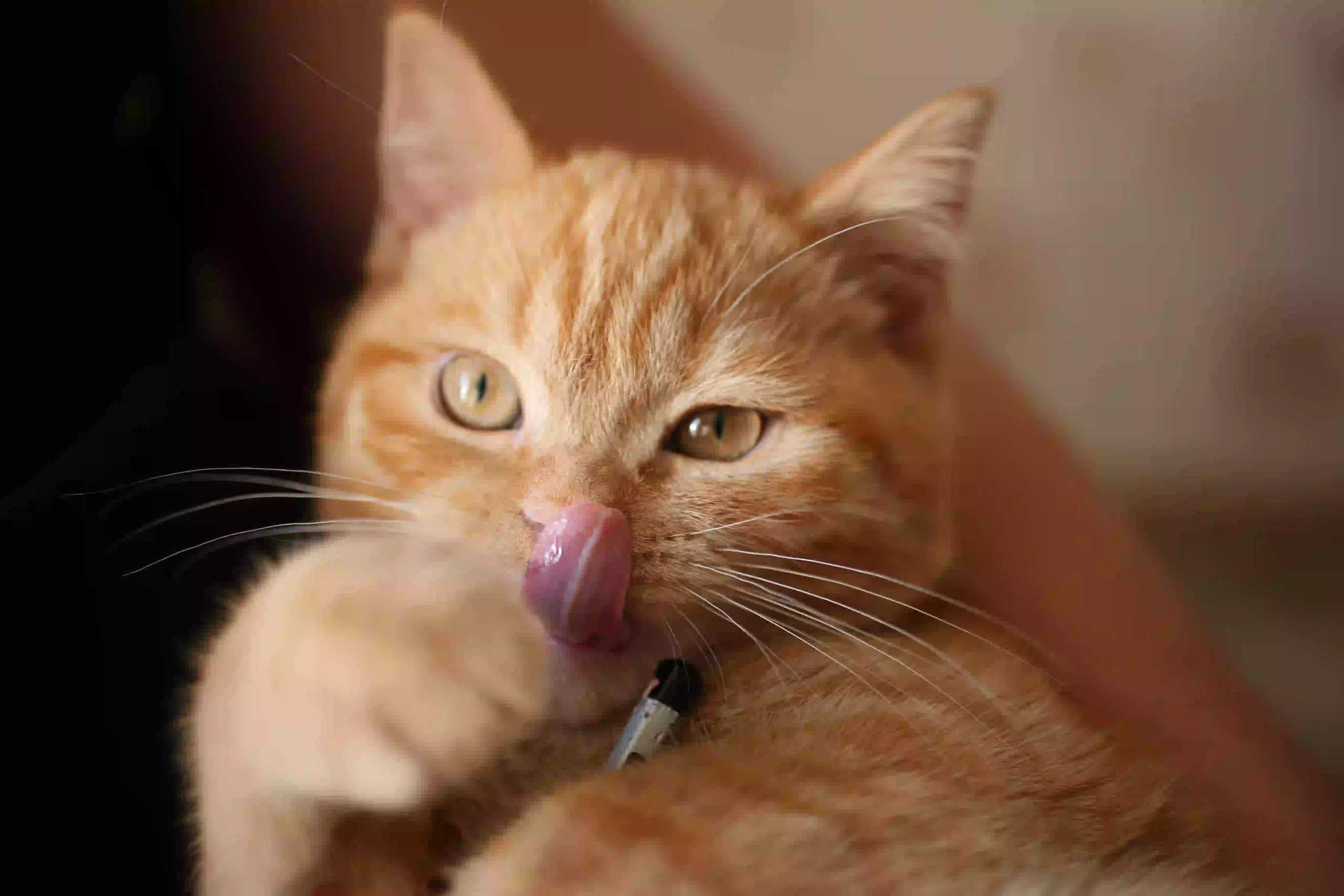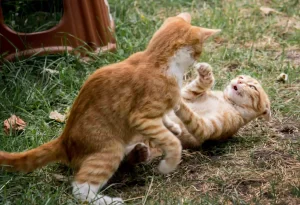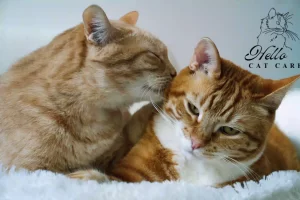Since cats use their tongues extensively for drinking and grooming, their tongue muscles are longer than in humans. This means that keeping their tongue out isn’t uncomfortable for them, unlike for us. Also, their mouths are drier, and their barbed tongues don’t feel as odd when dry, reducing the need to retract them immediately. Although a cat sticking out their tongue can be amusing, it’s important to understand why they do this to determine if any action is needed. Here are some common reasons for this behaviour.
Cats usually stick their tongue out when they’re relaxed and content. They may also blep using the Flehmen response to detect pheromones and scents. If the cat has food or pieces of a toy stuck in its mouth, it will stick out its tongue to expel that. Sometimes, a cat will even do this when it’s been poisoned and is trying to breathe easier.
A less harmless reason could be if it’s slightly overheated, so watch for symptoms of heat stroke. Unless your cat’s tongue exposure is excessive and is met with negative symptoms such as extreme panting, vomiting, or diarrhoea, this behaviour is harmless and even a bit humorous.
Now What Is Cat Blep Or Bleeping ?
The act of sticking one’s tongue out slightly without realizing it, often for long periods of time.
Cats are famous for their adorable “blips,” where they stick out their tongues and leave them out for a few seconds to several minutes. Cat owners find this behaviour irresistibly cute!
A blep typically happens when a cat investigates a new scent, gets distracted while grooming, or shows relaxed contentment. However, frequent or prolonged bleeping could indicate an underlying illness, so a vet check-up is advised.
While other animals like dogs and rabbits also blep, cats have made this quirky habit iconic!

Reason Why do cats stick their tongue out?
Relaxation
The most common reason cats stick out their tongues is due to feelings of relaxation. When cats are comfortable, they may squint, purr, and rub against you, showing signs of trust and calmness. As they relax, the muscles in their jaw may loosen, causing their tongue to protrude slightly.
Flehmen Response
The Flehmen response is an instinctive behaviour in many mammals, including cats. When they detect certain scents, cats may retract their lips and raise their head, creating a grimace and allowing their tongue to stick out. This response helps scent molecules reach the vomeronasal organ, enhancing scent detection.
Behavioural Conditioning
Cats learn through repetition and positive reinforcement. If a cat notices that sticking out its tongue makes you smile, speak affectionately, or offer treats, it may associate the behaviour with affection or rewards. In time, it might repeat it to seek attention or affection.
Missing Teeth or Oral Problems
Oral issues, such as missing canine teeth, can cause a cat’s tongue to fall out of their mouth. Additionally, cavities, gum disease, and other oral health issues can cause discomfort, and sticking out their tongue may be a reflex to alleviate pain. A vet visit is recommended if a cat shows signs of difficulty eating.
Other Health Problems
If a cat frequently sticks out their tongue, it could indicate other health issues, potentially neurological, such as dementia. Psychological stress may also cause this behaviour, leading the cat to lick their lips out of anxiety. Physical illnesses, like infectious diseases, can also cause tongue protrusion; a veterinary examination is essential to diagnose the problem.
Hair on Their Tongue
During grooming, hairs may get trapped on a cat’s tongue. If they can’t remove the hair, it may cause them to stick out their tongue. You can check their tongue and gently brush it with a specialized tongue brush to remove the hair. Increasing regular grooming, especially during shedding season, can help prevent this.
Why do cats forget to put their tongue in?
Cats sometimes leave their tongues out after being startled during grooming or becoming distracted while eating or smelling something. This behavior, known as bleeping, is often harmless. However, in senior cats, consistent bleps could indicate dementia. Additionally, cats use their tongue to pick up scents, transferring them to the roof of their mouth using a specialized sensing organ called the vomeronasal organ.
Why do cats stick out their tongues when sleeping?
It’s common to see cats stick out their tongue when sleeping. This often occurs when they are tired, and their jaw muscles relax. This behaviour can also be observed in kittens as their baby teeth emerge, and they may drool or have an increased urge to bite.
Why do cats pant with their tongue out?
Cats may pant with tongues out due to exercise, overheating, pain, respiratory illnesses, asthma, heart failure, ingesting objects, stress, or anemia. While occasional panting can be expected, persistent heavy breathing with an open mouth could indicate a problem. Cats might also stick out their tongue in distress if they have a dental issue or have tasted something unpleasant. Always consult a vet if the behavior seems unusual.
What does it mean when a cat bites its tongue?
Like dogs and humans, cats may occasionally bite their tongues while eating, playing, or during other activities. However, it’s essential to consult a vet if a tongue wound doesn’t heal or if the cat shows signs like excessive drooling or defensiveness when you try to inspect their mouth.
Are cats happy when they stick their tongue out?
When cats stick out their tongue, it’s often a sign of happiness. This behavior may indicate they feel comfortable, relaxed, or playful. For kittens, having their tongue out is typically a sign of relaxation and contentment, and it is almost always completely normal.
Does cat sticking tongue out mean hungry?
A cat sticking out its tongue does not indicate hunger. Instead, it usually reflects happiness, comfort, relaxation, or playfulness. This behavior is generally associated with their contentment rather than their need for food.
Why does my cat forget to close her mouth?
Cats may leave their mouths open to explore their environment. This behavior, known as the “flehmen response,” allows them to detect and analyze scents more effectively, such as when they smell another animal on their hand. Occasionally, cats also open their mouths during a “silent meow.”
Is it bad if cats pant?
Cats may pant when anxious, stressed, overheated, or after strenuous exercise. While this type of panting usually subsides once the cat has rested, calmed down, or cooled off, it is much less common in cats than in dogs. If panting occurs without an apparent cause, it is essential to consult a vet immediately.
Conclusion.
In conclusion, cats sticking out their tongues is a behavior that can range from being entirely harmless to signaling potential health concerns. It is often a sign of relaxation, contentment, or curiosity, such as during grooming, investigating scents, or the adorable phenomenon of bleeping. However, if the behavior becomes frequent or is accompanied by unusual symptoms like panting, drooling, or difficulty eating, it could indicate underlying issues such as oral health problems, overheating, or illness. Observing your cat’s behavior closely and seeking veterinary advice when necessary ensures their well-being while allowing you to enjoy their quirky and endearing habits.




